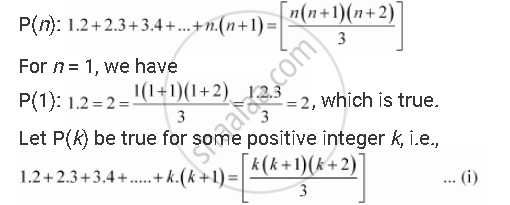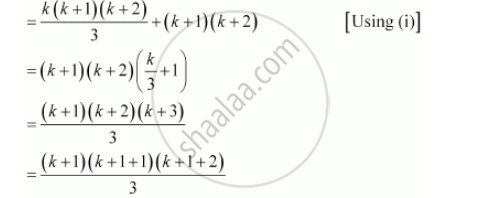Advertisements
Advertisements
प्रश्न
Prove the following by using the principle of mathematical induction for all n ∈ N:
1.2 + 2.3 + 3.4+ ... + n(n+1) = `[(n(n+1)(n+2))/3]`
उत्तर
Let the given statement be P(n), i.e.,

We shall now prove that P(k + 1) is true.
Consider
1.2 + 2.3 + 3.4 + … + k.(k + 1) + (k + 1).(k + 2)
= [1.2 + 2.3 + 3.4 + … + k.(k + 1)] + (k + 1).(k + 2)

Thus, P(k + 1) is true whenever P(k) is true.
Hence, by the principle of mathematical induction, statement P(n) is true for all natural numbers i.e., n.
APPEARS IN
संबंधित प्रश्न
Prove the following by using the principle of mathematical induction for all n ∈ N: 1.2.3 + 2.3.4 + … + n(n + 1) (n + 2) = `(n(n+1)(n+2)(n+3))/(4(n+3))`
Prove the following by using the principle of mathematical induction for all n ∈ N:
Prove the following by using the principle of mathematical induction for all n ∈ N:
Prove the following by using the principle of mathematical induction for all n ∈ N: 102n – 1 + 1 is divisible by 11
Prove the following by using the principle of mathematical induction for all n ∈ N: x2n – y2n is divisible by x + y.
If P (n) is the statement "2n ≥ 3n" and if P (r) is true, prove that P (r + 1) is true.
\[\frac{1}{1 . 2} + \frac{1}{2 . 3} + \frac{1}{3 . 4} + . . . + \frac{1}{n(n + 1)} = \frac{n}{n + 1}\]
1 + 3 + 5 + ... + (2n − 1) = n2 i.e., the sum of first n odd natural numbers is n2.
\[\frac{1}{2 . 5} + \frac{1}{5 . 8} + \frac{1}{8 . 11} + . . . + \frac{1}{(3n - 1)(3n + 2)} = \frac{n}{6n + 4}\]
\[\frac{1}{3 . 7} + \frac{1}{7 . 11} + \frac{1}{11 . 5} + . . . + \frac{1}{(4n - 1)(4n + 3)} = \frac{n}{3(4n + 3)}\]
1.2 + 2.3 + 3.4 + ... + n (n + 1) = \[\frac{n(n + 1)(n + 2)}{3}\]
n(n + 1) (n + 5) is a multiple of 3 for all n ∈ N.
72n + 23n−3. 3n−1 is divisible by 25 for all n ∈ N.
11n+2 + 122n+1 is divisible by 133 for all n ∈ N.
Given \[a_1 = \frac{1}{2}\left( a_0 + \frac{A}{a_0} \right), a_2 = \frac{1}{2}\left( a_1 + \frac{A}{a_1} \right) \text{ and } a_{n + 1} = \frac{1}{2}\left( a_n + \frac{A}{a_n} \right)\] for n ≥ 2, where a > 0, A > 0.
Prove that \[\frac{a_n - \sqrt{A}}{a_n + \sqrt{A}} = \left( \frac{a_1 - \sqrt{A}}{a_1 + \sqrt{A}} \right) 2^{n - 1}\]
Show by the Principle of Mathematical induction that the sum Sn of then terms of the series \[1^2 + 2 \times 2^2 + 3^2 + 2 \times 4^2 + 5^2 + 2 \times 6^2 + 7^2 + . . .\] is given by \[S_n = \binom{\frac{n \left( n + 1 \right)^2}{2}, \text{ if n is even} }{\frac{n^2 \left( n + 1 \right)}{2}, \text{ if n is odd } }\]
\[\text{ A sequence } x_0 , x_1 , x_2 , x_3 , . . . \text{ is defined by letting } x_0 = 5 and x_k = 4 + x_{k - 1}\text{ for all natural number k . } \]
\[\text{ Show that } x_n = 5 + 4n \text{ for all n } \in N \text{ using mathematical induction .} \]
Prove by method of induction, for all n ∈ N:
3 + 7 + 11 + ..... + to n terms = n(2n+1)
Prove by method of induction, for all n ∈ N:
12 + 22 + 32 + .... + n2 = `("n"("n" + 1)(2"n" + 1))/6`
Prove by method of induction, for all n ∈ N:
`1/(1.3) + 1/(3.5) + 1/(5.7) + ... + 1/((2"n" - 1)(2"n" + 1)) = "n"/(2"n" + 1)`
Prove by method of induction, for all n ∈ N:
(23n − 1) is divisible by 7
Prove by method of induction, for all n ∈ N:
Given that tn+1 = 5tn + 4, t1 = 4, prove that tn = 5n − 1
Answer the following:
Prove, by method of induction, for all n ∈ N
`1/(3.4.5) + 2/(4.5.6) + 3/(5.6.7) + ... + "n"/(("n" + 2)("n" + 3)("n" + 4)) = ("n"("n" + 1))/(6("n" + 3)("n" + 4))`
Answer the following:
Prove by method of induction
`[(3, -4),(1, -1)]^"n" = [(2"n" + 1, -4"n"),("n", -2"n" + 1)], ∀ "n" ∈ "N"`
Answer the following:
Prove by method of induction 152n–1 + 1 is divisible by 16, for all n ∈ N.
Prove statement by using the Principle of Mathematical Induction for all n ∈ N, that:
2n + 1 < 2n, for all natual numbers n ≥ 3.
Prove the statement by using the Principle of Mathematical Induction:
23n – 1 is divisible by 7, for all natural numbers n.
Prove the statement by using the Principle of Mathematical Induction:
n3 – 7n + 3 is divisible by 3, for all natural numbers n.
Prove the statement by using the Principle of Mathematical Induction:
32n – 1 is divisible by 8, for all natural numbers n.
Prove the statement by using the Principle of Mathematical Induction:
For any natural number n, xn – yn is divisible by x – y, where x and y are any integers with x ≠ y.
Prove the statement by using the Principle of Mathematical Induction:
n3 – n is divisible by 6, for each natural number n ≥ 2.
A sequence b0, b1, b2 ... is defined by letting b0 = 5 and bk = 4 + bk – 1 for all natural numbers k. Show that bn = 5 + 4n for all natural number n using mathematical induction.
A sequence d1, d2, d3 ... is defined by letting d1 = 2 and dk = `(d_(k - 1))/"k"` for all natural numbers, k ≥ 2. Show that dn = `2/(n!)` for all n ∈ N.
If xn – 1 is divisible by x – k, then the least positive integral value of k is ______.
If P(n): 2n < n!, n ∈ N, then P(n) is true for all n ≥ ______.
